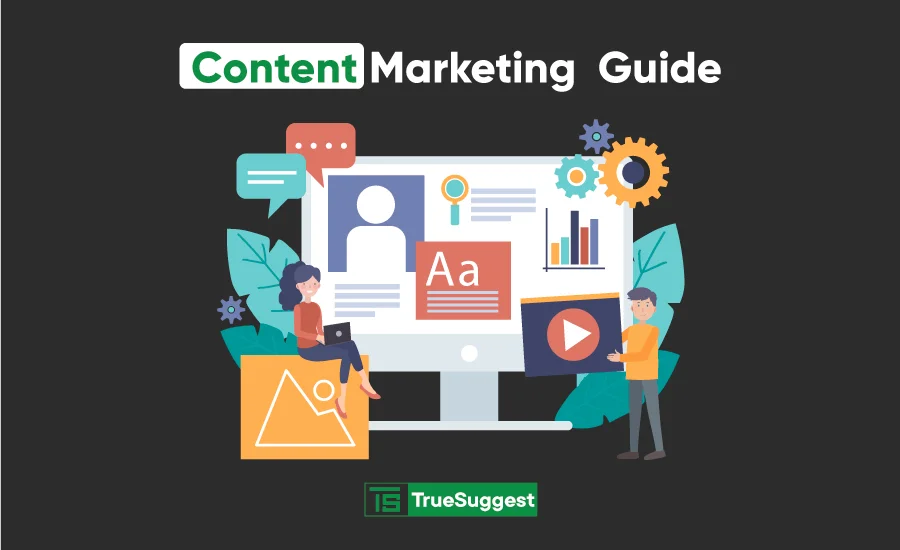Content Marketing Service - A Quick Guideline

Content marketing is a strategic marketing approach focused on creating and distributing valuable, relevant, and consistent content to attract and retain a clearly defined audience — and, ultimately, to drive profitable customer action. Instead of pitching products or services, content marketing aims to provide genuinely useful and relevant information to potential customers to solve their problems or meet their needs. By doing so, it builds trust and rapport, encouraging customer loyalty and long-term engagement.
Types of Content Marketing
1. Blog Posts
Regularly updated articles that provide valuable information, tips, or insights related to your industry. Blogs are great for SEO and keeping your audience engaged.
2. Videos
Engaging and easily digestible, videos can explain complex concepts, showcase products, or tell your brand’s story. They are highly shareable and can boost engagement on social media.
3. Infographics
Visual representations of information or data that are easy to understand and share. Infographics can simplify complex information and make it more appealing to your audience.
4. Ebooks and Whitepapers
In-depth, downloadable resources that provide comprehensive information on a particular topic. These are excellent for generating leads, as they often require contact information in exchange for the download.
5. Social Media Posts
Short and engaging posts on platforms like Facebook, Twitter, LinkedIn, and Instagram. These can include text, images, videos, or links to other content.
6. Podcasts
Audio content that can be consumed on the go. Podcasts are great for reaching audiences who prefer listening to reading.
7. Case Studies and Testimonials
Real-life examples of how your product or service has helped customers. These build trust and provide social proof.
How Content Marketing Works
Your business can leverage content marketing to attract leads, make a compelling case for your product or service during research, and ultimately close sales. To maximise effectiveness, deliver the right content at each stage of the sales cycle—from awareness through consideration to purchase.
While this might sound complex, approaching content in this way simplifies the process. Here's how companies use content marketing at each stage of the sales cycle to engage and convert customers.
Awareness Stage
In the first stage of the sales process, your content should address the top concerns of your audience. Writing about their pain points, challenges, and questions engages them effectively. Focus on providing educational, how-to advice, and save your selling for later stages.
Ideal content for this stage includes articles, blog posts, e-books, videos, and newsletters.
Examples:
- A restaurant writes a blog post about planning a menu for a spring graduation party.
- A bike touring company creates a short video titled “3 Ways to Choose the Right Bike Trip.”
- An architecture firm publishes an e-book called “Questions to Ask Before Hiring an Architect.”
Consideration Stage
At the consideration stage, content should offer a mix of helpful information and marketing. Educate readers on what features or functions to look for and how these features address their needs, while subtly leaning towards your offerings. Effective content for this stage includes case studies, how-to articles, how-to videos, and checklists or worksheets.
Examples:
- A cloud-based phone system company creates a checklist titled “8 Ways to Improve Your Phone Customer Service” detailing features that enhance customer service.
- A landscaping company publishes case studies about “The Biggest Mistakes Most People Make When They Hire a Landscaper.”
- A catering company features case studies of successful events, such as “How to Accommodate Food Allergies at Your Next Event” or “How to Ensure Your Caterer Uses Sustainable Practices.”
Closing Stage
When a prospect is close to buying, content marketing plays a crucial role. Focus on demonstrating why you’re the best choice, emphasizing your expertise, knowledge, and the unique benefits of your products or services. Optimal content for this stage includes case studies, user-generated content, buyer’s guides, product videos, and research reports.
Examples:
- A consulting firm publishes a research report showing that businesses engaging in strategic planning and assessments experience higher growth, highlighting their services.
- A design agency creates short videos showcasing their work across various industries to demonstrate their diverse expertise.
- An orthodontist practice encourages patients to share testimonials about their state-of-the-art equipment and top-notch service.
What Are Some Examples of Brands Using Content Marketing?
Several brands have successfully leveraged content marketing to engage their audiences and drive business results. For instance, Coca-Cola uses storytelling in its content to create emotional connections with its audience. HubSpot is another example, offering a wealth of valuable resources, including blogs, ebooks, and webinars, to educate its audience about inbound marketing. Red Bull creates high-energy, adventurous content that aligns perfectly with its brand image and appeals to its target audience.
Why Use Content Marketing?
1. Builds Trust and Credibility
By providing valuable information, you establish your brand as a thought leader and a trusted resource. Customers are more likely to engage with and purchase from brands they trust.
2. Improves SEO and Organic Search Visibility
High-quality, relevant content improves your search engine rankings. Regularly updated blogs, articles, and other forms of content signal to search engines that your site is active and relevant, increasing your chances of being found by potential customers.
3. Generates Leads and Conversions
Informative and engaging content can guide potential customers through the buyer’s journey, from awareness to consideration to decision. By addressing their questions and pain points, you can convert them into leads and, eventually, paying customers.
4. Brand Awareness
Content marketing helps to increase your brand’s visibility and awareness. When your content is shared across social media and other platforms, it reaches a broader audience, enhancing your brand’s presence.
5. Supports Other Marketing Strategies
Content is the foundation of many other marketing strategies, such as social media marketing, email marketing, and even paid advertising. High-quality content can fuel these channels and make them more effective.
6. Cost-Effective
Compared to traditional marketing methods, content marketing is often more cost-effective. It delivers long-term results, as the content you create today can continue to attract and engage customers for years to come.
Content Marketing and SEO
Content marketing helps your prospects find your business, but you can enhance your efforts with search engine optimization (SEO).
Key Best Practices:
Keywords are the foundation of your SEO strategy. These vital words and phrases are what prospects type into search engines when looking for a company, product, or service.
Including the right keywords in your content will attract more traffic. The best keywords are:
Plain Language: Terms your audience uses to describe their pain points and needs.
Relevant: Keywords that match the expertise, products, and services you offer.
Specific: A blend of your focus, industry expertise, prospect pain points, and other relevant details.
SEO has evolved, and search success now depends partly on how well your content delivers on its promises. Search engines evaluate content for relevance and whether it fulfils the promise of the headline. Given the importance of search engine evaluation, using keywords throughout your content is crucial. Follow these guidelines:
Focus on 1 to 2 keywords: Avoid “keyword stuffing” by concentrating on just a few keyword phrases relevant to your prospects.
Use keywords in the title: Ensure the title clearly reflects the article's content.
Incorporate keywords naturally: Integrate your keywords seamlessly into your content.
Stay on topic: High-quality content that offers advice related to the headline performs best.
Social Media and Content Marketing
Leveraging social media alongside content marketing can further boost your reach and engagement. Share your optimised content on platforms where your audience is active to drive traffic and enhance visibility.
Endnote
Content marketing is a powerful tool for building trust, generating leads, and driving long-term business success. By providing valuable, relevant content, you can attract and engage your target audience, establish your brand as an authority. Ultimately drive profitable customer action.
With a well-planned content strategy, you can harness the full potential of content marketing to achieve your business goals



























